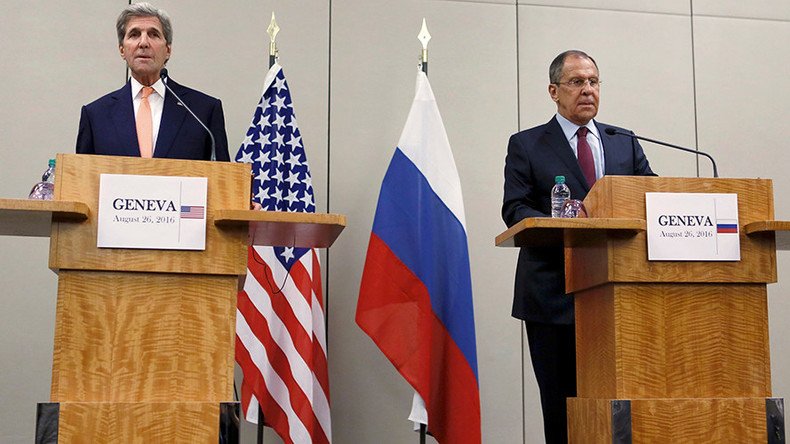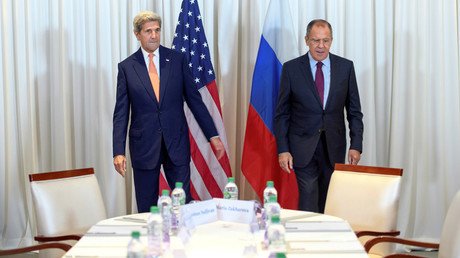‘US pretends there are moderates in Syria, Russia understands they are all terrorists’

Can we expect a change to a more cooperative strategy on the ground in Syria after the Geneva talks between Russia and the US? Or was it a big enough achievement that both countries were able to sit down and understand each other better? RT asked experts.
On Friday, Russian Foreign Minister Sergey Lavrov and US Secretary of State John Kerry met in Geneva for a 12-hour marathon session to discuss their countries’ respective strategies in Syria. The diplomats claimed they had made progress during the talks, saying they had reduced areas of misunderstanding. No official breakthrough statement was made, however.
RT asked experts if the talks between third parties in Geneva could result in a solution for Syria, and what the prospects were for the peace process if the sides still can’t agree on who the terrorists are there.
Richard H. Black, a state senator representing Virginia’s 13th District, said the negotiations on Syria in Geneva are “going to be very difficult, because right now there is an enormous battle taking place for Aleppo.”
“The Syrian Army, with the help of Russia and Iran, has managed to cordon off the Aleppo pocket. And they’ve trapped Al-Qaeda inside the pocket. The US likes to talk about moderate rebels; there are groups of rebels that are under the command of Al-Qaeda in the Aleppo pocket.”
Black said that “what is really providing so much incentive for the peace talks is that the US and Turkey are very concerned because Al-Qaeda has been surrounded, also the Syrian Army has made dramatic gains in the Damascus area.”
In Black’s opinion, part of the problem is that “the US has consistently held this diplomatic line that there are moderate terrorists who can be distinguished from Al-Nusra.”
“All of them are part of something called the Army of Conquest that was set up by Saudi Arabia and Turkey in 2015. They are under the general command of Al-Nusra. So, you have groups like Jaysh al-Islam, the al-Zenko group – very violent terroristic groups that we term “moderates,” but they are really identical to al-Nusra,” he said.
Sorting these groups out is difficult, according to the state senator, as they are all fighting under the joint command of the Army of Conquest.
“The headquarters of the Army of Conquest is in Idlib. It controls the terrorist armies throughout Syria, except for ISIS [Islamic State, IS, formerly ISIL], which operates independently,” he told RT.
“The US pretends there are moderate terrorists and Russia understands, I think, quite clearly, that there are not moderate terrorists: they all are the same group; they use different names here and there, but they are part of the Army of Conquest, which is a terrorist army,” Senator Black said.
Former CIA officer Ray McGovern said that before the Geneva talks there were “great hopes they would finally be able to think things through and get an agreement,” but that did not happen, and no agreement was reached between the US and Russia as to who can be considered the “moderate” opposition.
“You have a lot of rebels that are immoderate, that are really out for blood, and many of those are trained and armed by the CIA, and they developed ties with Al-Nusra, a mutually agreed upon terrorist organization,” he said.
“What the Russians have been asking for the last six months is ‘Please, please Americans, give us some map. Just tell us where your good guys, where your moderates are and we won’t bomb them.’ And that can’t be done,” McGovern said.
During the media conference following the Geneva talks, Secretary Kerry was asked about how so-called moderates could be distinguished from terrorist groups.
“It is not a helpful situation, and we’re expressing concern about it with the Russians and working on ways to deal with this. This is precisely the kind of detail that we’ve been working through over the course of the last weeks,” Kerry said.
According to McGovern, “John Kerry is not in control, and it is not over the course of the last weeks, it is over the course of the last months.”
“The CIA is in control of the ‘moderate’ rebels, and the Pentagon is in control of the five that are left after our country invested a hundred million dollars to develop moderate rebels responsive to the Pentagon,” he told RT.
“Whatever Kerry tries to do, he is handicapped by the necessity to bow to the CIA, to bow to the Defense Department, and try to explain everything to Lavrov, which is really hard to explain,” McGovern added.
Lavrov and Kerry give joint statement following 12 hours of "productive and constructive" marathon talks on Syria pic.twitter.com/FaQS6RV48U
— Emily Siu (@emily_siu) August 26, 2016
The US’ hesitation about which side to support and how to come to a resolution creates more questions than answers regarding this latest resolution, says Firat Demir, an Associate Professor in the Department of Economics at the University of Oklahoma.
“We have to remember the elections are only few months ahead in the US. Barack Obama is going to leave his term to a new president who will probably have a different perspective on the war in Syria. So, it looks like the Obama administration is trying to bring an end to the hostilities at least, but leave the real burden of reconstruction and [finding] a viable solution to the conflict to the next president of the US,” he added.
The statements, views and opinions expressed in this column are solely those of the author and do not necessarily represent those of RT.














